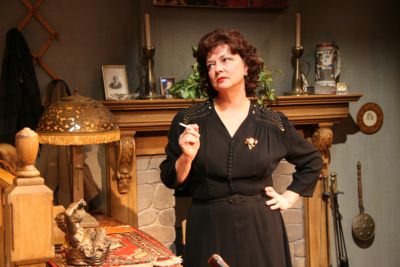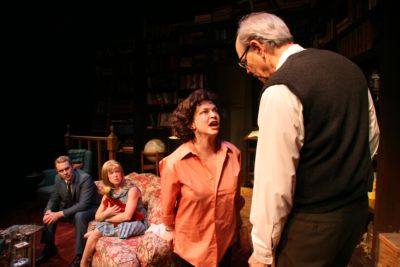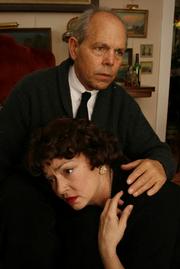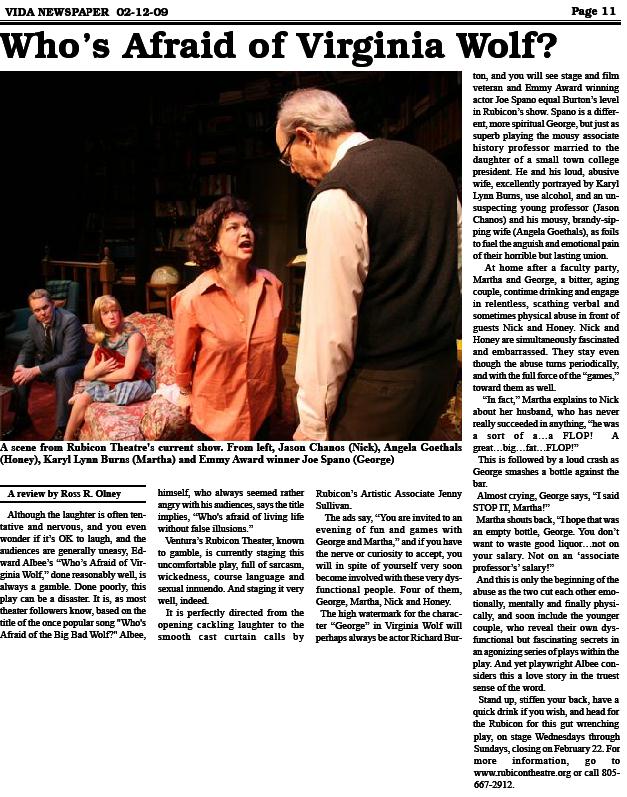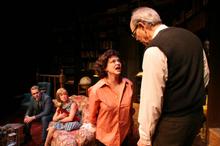Edward Albee knew something about darkness and love when he penned Who’s Afraid of Virginia Woolf, his celebrated drama that bows this month at Ventura’s Rubicon Theatre in an electrifying production directed by Jenny Sullivan. The play has enjoyed multiple runs on Broadway, garnering numerous Tony awards, and the 1966 Mike Nichols film was honored with four Oscars®. While lauded, the work has also met with controversy; Albee’s play was selected for the 1963 Pulitzer Prize for drama, but the award’s trustees objected to the play’s themes and profanity, and subsequently no Prize was awarded in that year. By the same token, the film is credited with being responsible for Jack Valenti’s creation of the MPAA film rating system that largely endures to this day.
Woolf centers around a mediocre academic — George — whose life and career seem to be circling the drain. The fact is rendered inescapable as it’s underscored — even commemorated — by his wife Martha’s unrelenting, caustic commentary on the matter. When a young professor and his wife accept Martha’s invitation for late evening drinks after a faculty mixer, they get far more than they bargained for in their hosts’ bitter, no-holds-barred repartee that ultimately smashes such social niceties as propriety and dignity and brings all of them in turn to their knees.
While the couple is styled after real-world Albee acquaintances, a New York socialite couple whose marathon alcoholic salons were legendary in their day, the couple’s namesakes are thought to obviously be the nation’s “first couple,” George and Martha Washington. Such radical restyling of the parents of our nation, in such a thoroughly dark and contemporary idiom, can, in retrospect, be seen as a most cogent preview of the social explosion that was to follow.
Virginia Woolf is challenging theater, to be sure — peppered as it is with coarse language and social savagery; and though it’s liberally laced with wry humor, it’s not for the faint of heart. Yet in challenging times – either those for which it was first intended or to this very day it offers altogether compelling lessons on life and love, serving them up in a staccato rhythm of wit and pathos that makes for an engrossing evening and a true theatrical adventure.
“When you come into the theater,” celebrated playwright David Mamet noted, “you have to be willing to say, ‘We’re here to undergo a communion, to find out what the hell is going on in this world.’ If you’re not willing to say that, what you get is entertainment instead of art, and poor entertainment at that.” Mamet could well have been speaking of the deeply compelling art of this production: of Joe Spano’s George, who, just when he seems beaten, can roar like a lion; of Karyl Lynn Burns’ Martha and her rapier tongue, flitting from social sadist to crafty coquette and back again; of Jason Chanos’ and Angela Goethal’s turns as the unwitting playmates Nick and Honey, who prove to be altogether more than fodder for Martha’s dark social grist.
While the work feels contemporary, the themes are old, indeed it’s been more than 150 years since Thoreau noted, “The mass of men lead lives of quiet desperation. An unconscious despair is concealed even under what are called the games and amusements of mankind.” Thoreau would have recognized well the games of George and Martha for what they were, and yet they are not without love — and therein lies the heart of the matter, for Virgina Woolf is a love story from start to finish, offering us a look into a ‘dark glass’ that reflects our own lives and loves. As we find in that glass, and in each of our own hearts, an echo of George, Martha, Nick and even Honey, perhaps we also might hear once again the refrain of 1 Corinthians, “If I have the gift of prophecy and can fathom all mysteries and all knowledge, but have not love, I am nothing.” In the end, no matter the indignation and woe, it’s love by which George and Martha are redeemed, and it’s by that same measure that we all, sooner or later, must stand.
Through Feb. 22, at the Rubicon Theatre, 1006 E. Main St., Ventura. 667-2900, www.rubicontheater.org.
CROSSING THE RUBICON
by Paul Sisolak
paul@vcreporter.com
 Ten years ago, when a married couple entrenched in the world of theater decided to found their own production company in Ventura, they looked no further than the stage for some well-meaning inspiration; namely, Julius Caesar.
Ten years ago, when a married couple entrenched in the world of theater decided to found their own production company in Ventura, they looked no further than the stage for some well-meaning inspiration; namely, Julius Caesar.
Karyl Lynn Burns and Jim O’Neill knew the legendary commander’s Shakespearean trek across the famed Italian tributary — it’s become that catch-all for reaching that point of no return, the edge of the precipice — was where they’d soon be poised, when converting the former church on the corner of Main and Laurel streets into a community theater.
Appropriately enough, the duo named their performance company the Rubicon, and hasn’t looked back since. “It was at that time we decided the timing was right to start something we could do on our own,” O’Neill recalls.
Today, the Rubicon remains the only professional theater company in Ventura County and celebrates its first full decade without too much fanfare. Despite its typically modest approach, there’s no denying that the Rubicon’s influence has reached even beyond the Ventura County border.
The Los Angeles Stage Alliance awarded the Rubicon four Ovation awards (the Southern California equivalent of a Tony) in November, recognizing the theater across the board for production, acting, set design and original musical content. It received a total of 17 nominations.
The accolades from L.A. weren’t part of an isolated event. The Rubicon has seemingly enjoyed an inordinate amount of success in L.A. while removed far enough from the confines of the big city. The key? Their influence, says John Hankins, vice president of the Ojai Arts Center Theater (ACT).
“What’s nice about them is that they’re very inspiring for community theaters,” he said. “Their choice of plays is also very good. They can get very edgy also by taking a chance. From that standpoint, they’re a beacon of light for live theater.”
So if local theater troupes are keeping an eye on the Rubicon for inspiration, they would be keen to note the company’s upcoming production of Fiddler on the Roof, which O’Neill will direct. It follows a lineup of challenging plays that have run in the current season, “O Brave New World,” which has included productions of The Spin Cycle, Will Rogers’ America and currently Who’s Afraid of Virginia Woolf.
It also indicates that while the theater, like almost every other entertainment outlet, is challenged by poor economics, it thankfully still thrives. The Rubicon’s growth has been steady, its full-scale productions demanding; last year’s budget topped $3.5 million, 10 times the theater’s fledgling first-year operating costs of $350,000.
Does this mean the Rubicon is getting too big for the former house of worship where it resides? No, says O’Neill. Despite the buzz in local theater circles, the Rubicon won’t be looking to relocate. According to O’Neill, it comes down to one part practicality, one part nostalgia. “We don’t think the space we have is too small for some things,” he said. “We would never think about getting away from the Rubicon. There’s something very special inhabiting that space.”
However, O’Neill adds, as a way of expanding the existing business model, the Rubicon is in search of a second, additional theater space to supplement the longstanding Main Street venue. No location has yet been determined.
According to Burns, this step-up professionally was also foreshadowed in the introduction of the company’s first full-time managing director. Ken Wesler was hired at the beginning of the New Year.
For Burns, fertilizing Ventura County’s cultural landscape is as important as the company’s own success. “Our focus has always been art and community. As we move into the second decade, we are trying to grow Rubicon as a permanent community institution. We hope to continue to provide diverse theatrical offerings, landmark events and education and outreach programs for many years to come,” she said.
For more info on the Rubicon Theater Company, its schedule, classes, and how to donate, visit www.rubicontheatre.org.
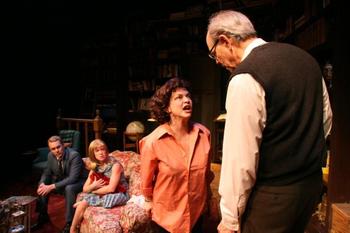 The growling “Hey!” that Martha uses to summon her husband, George, in the Rubicon Theatre Company’s production of “Who’s Afraid of Virginia Woolf?” is a guttural noise choked with savagery and a thick smoker’s phlegm. An emasculating sound if ever one existed, her bark is the recurring audio motif of this rousing revival, which brings an invigorating if sometimes strained animalism to Edward Albee’s classic vivisection of WASP marriage.
The growling “Hey!” that Martha uses to summon her husband, George, in the Rubicon Theatre Company’s production of “Who’s Afraid of Virginia Woolf?” is a guttural noise choked with savagery and a thick smoker’s phlegm. An emasculating sound if ever one existed, her bark is the recurring audio motif of this rousing revival, which brings an invigorating if sometimes strained animalism to Edward Albee’s classic vivisection of WASP marriage.
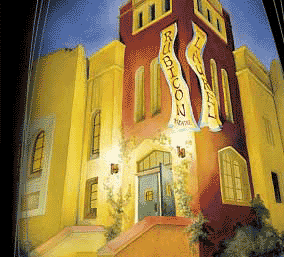


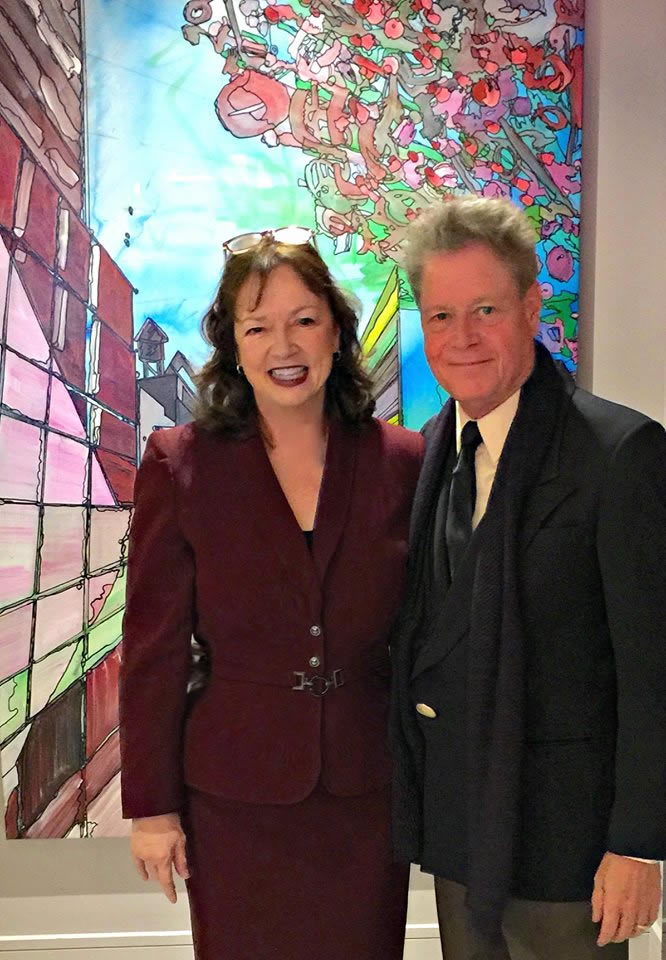

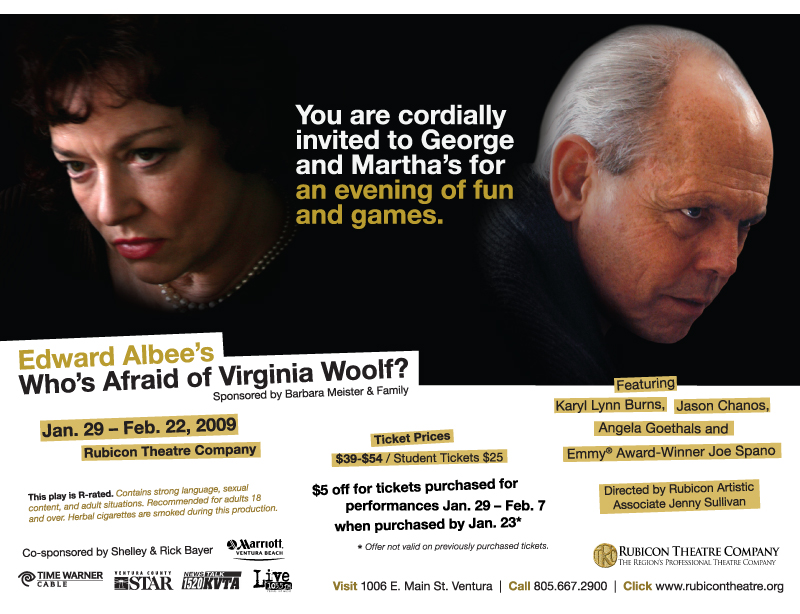

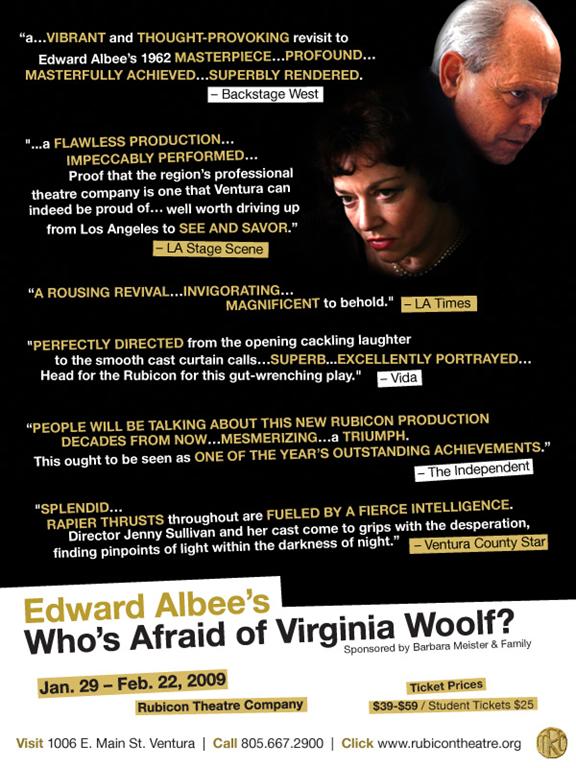

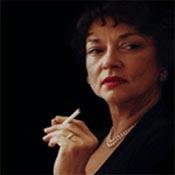


 Ten years ago, when a married couple entrenched in the world of theater decided to found their own production company in Ventura, they looked no further than the stage for some well-meaning inspiration; namely, Julius Caesar.
Ten years ago, when a married couple entrenched in the world of theater decided to found their own production company in Ventura, they looked no further than the stage for some well-meaning inspiration; namely, Julius Caesar.

